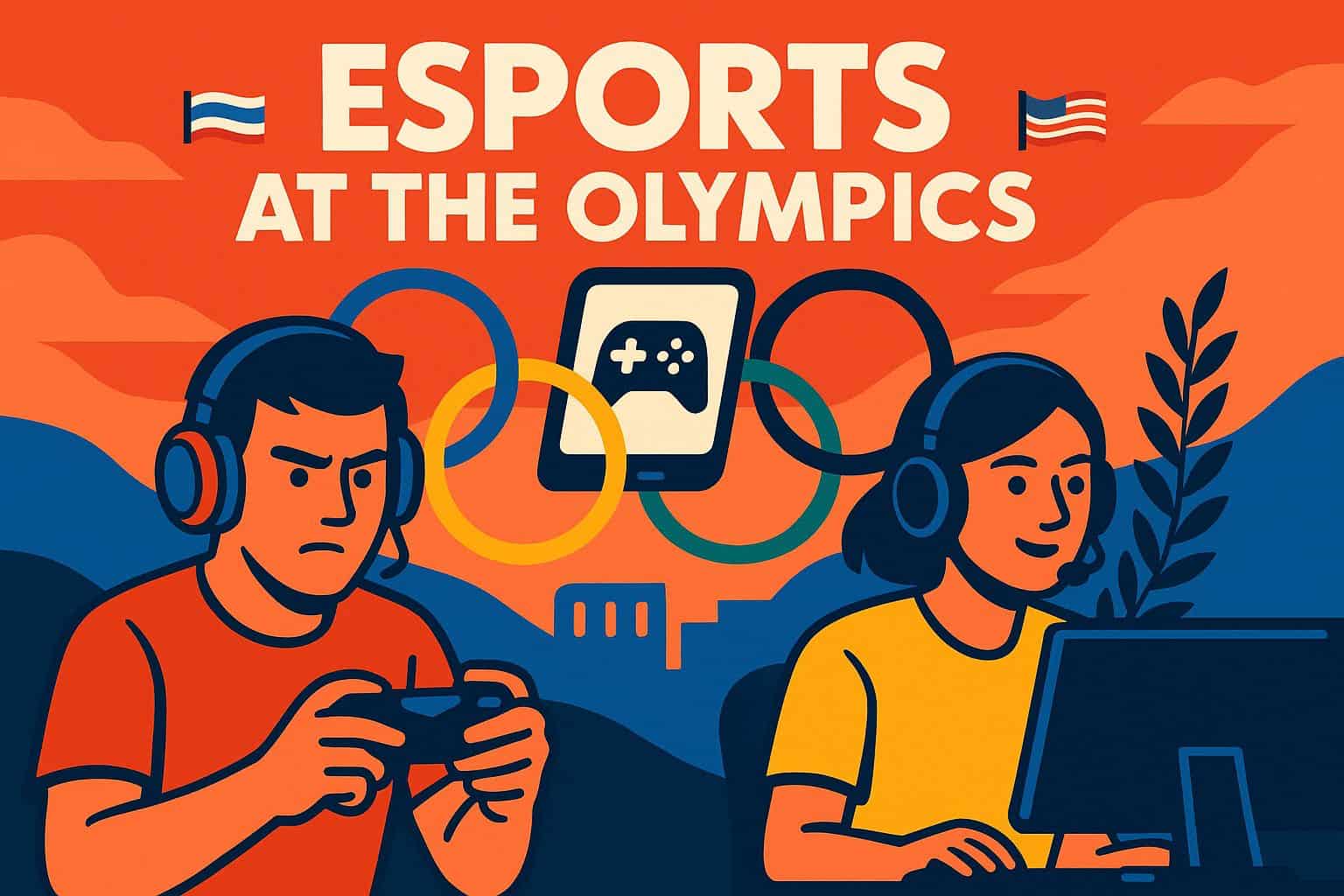Many gamers wonder if their favorite competitive video games will ever make it to the Olympic Games. The International Olympic Committee announced that the first Olympic Esports Games will take place in 2027 in Saudi Arabia, marking a huge shift for the Olympic Movement.
This article breaks down everything you need to know about esports at the Olympics, from past events like Olympic Esports Week to the five major changes coming with the 2027 games.
Get ready to discover how virtual sports will reshape the future of Olympic competition.
Key Takeaways
The first Olympic Esports Games will take place in Riyadh, Saudi Arabia, in 2027, marking a historic shift for Olympic competition.
The IOC excludes violent games from Olympic esports, focusing instead on sports simulations that align with traditional Olympic values and principles.
Olympic Esports Week 2023 in Singapore attracted 20,000 spectators and featured 131 athletes from 57 nations competing in ten different events.
Virtual sports like taekwondo, Gran Turismo 7 racing, chess, tennis, and baseball will likely feature in the 2027 Olympic Esports Games.
Esports integration aims to engage younger audiences while promoting innovation and inclusivity through digital platforms and virtual competition formats.
Table of Contents
The Evolution of Esports in the Olympic Movement
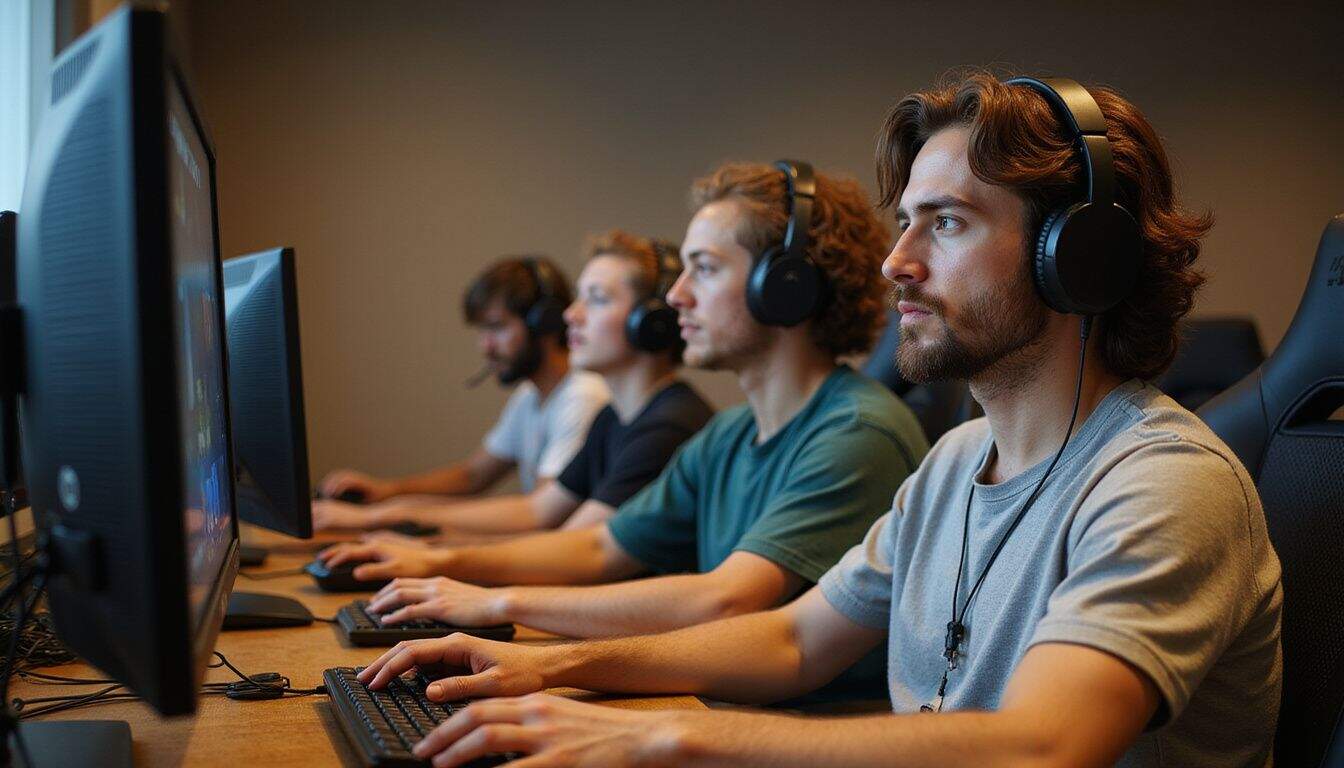
The IOC has slowly warmed up to competitive gaming over the past few years. They started testing the waters with virtual sports events that mirror traditional Olympic competitions.
I bet that esports betting will be huge once esports starts at the Olympics—you can learn more on win.gg about how the betting scene might evolve.
The Olympic movement has carefully picked games that match their values, avoiding violent titles while embracing sports simulations.
What was the Olympic Virtual Series 2021?
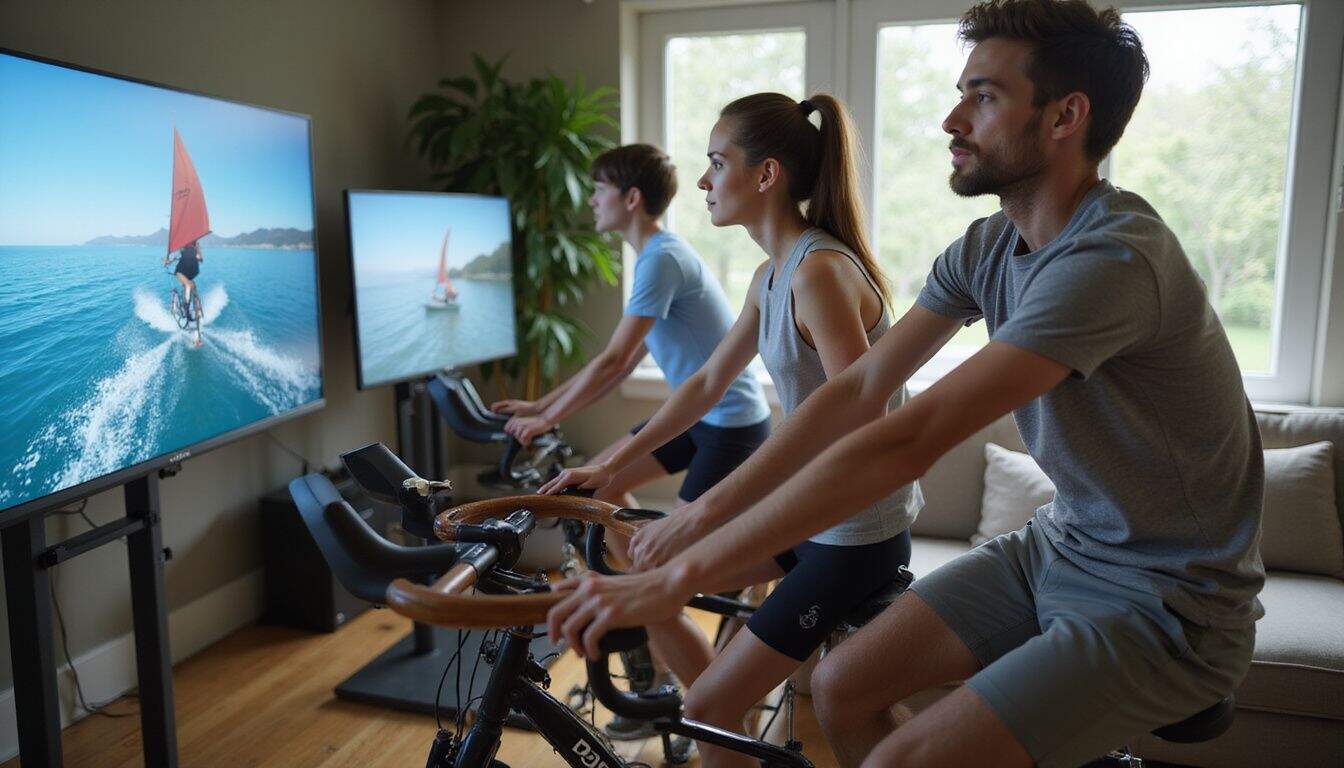
The Olympic Virtual Series began in 2021 as the first official Olympic event centered on virtual sports. IOC officials created this initiative during the COVID-19 pandemic, having recognized esports as sporting activities in 2017.
Five traditional Olympic sports formed the basis: baseball, cycling, motorsport, rowing, and sailing. Each competition linked directly to established Olympic disciplines rather than mainstream competitive gaming titles.
Participants received trophies instead of Olympic medals for their achievements. Critics questioned the series for excluding popular esports titles like League of Legends, Rocket League, and Street Fighter 6.
Many competitive video gaming enthusiasts were disappointed by the limited game selection. The Olympic Virtual Series faced concerns about alignment with traditional Olympic values, yet it opened the door for future esports integration.
This virtual competition acted as an important step toward the Olympic Esports Games planned for 2027 in Riyadh, Saudi Arabia.
The Olympic Virtual Series represents our commitment to engaging with the esports community and exploring new ways to promote Olympic values in the digital space.
What happened during Olympic Esports Week 2023?
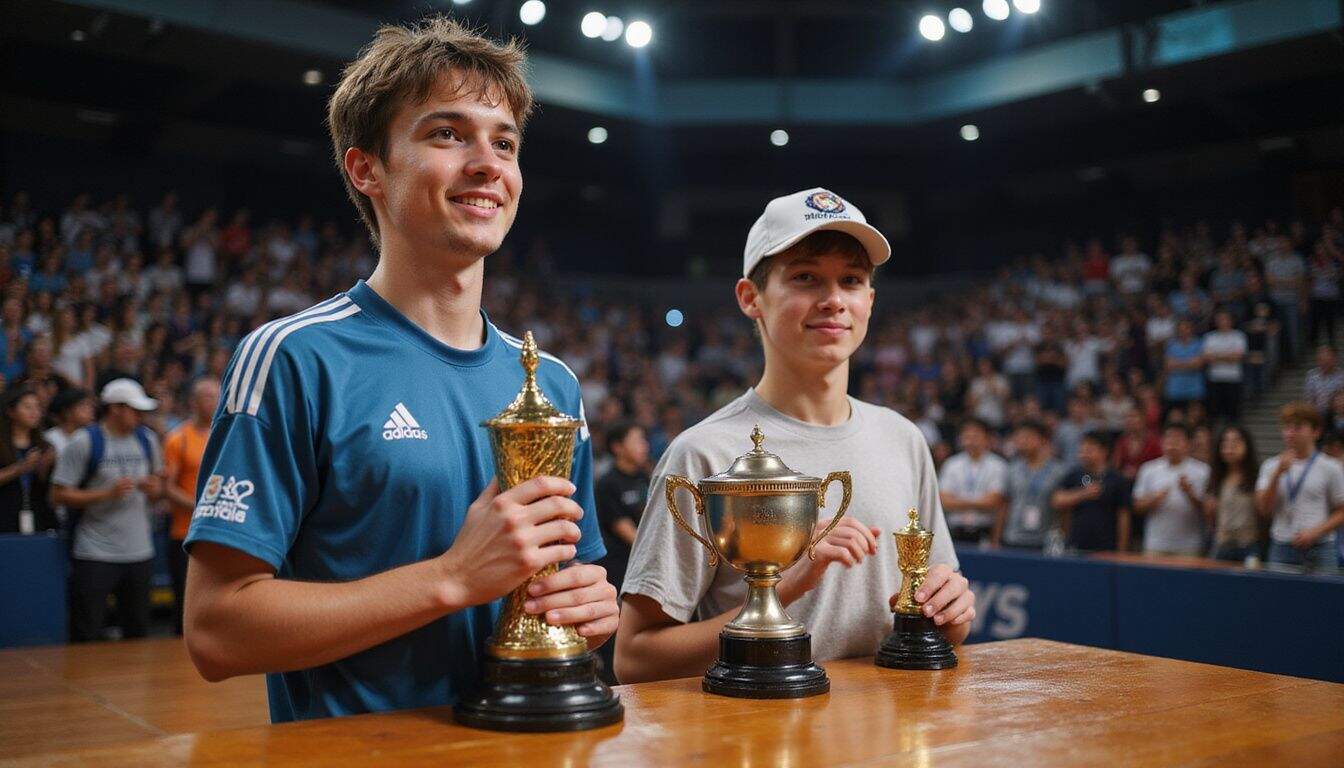 Olympic Esports Week 2023 took place in Singapore from June 22 to June 25. This significant event attracted about 20,000 spectators who watched esports athletes compete in ten different competitions.
Olympic Esports Week 2023 took place in Singapore from June 22 to June 25. This significant event attracted about 20,000 spectators who watched esports athletes compete in ten different competitions.
A total of 131 athletes from 57 nations participated in events including archery, baseball, chess, cycling, dance, motorsport, sailing, shooting, taekwondo, and tennis. Six exhibitions also occurred during the four-day event, featuring various simulation games that reflected traditional Olympic sports.
Competition organizers awarded trophies to the top three participants in each event instead of traditional Olympic medals. Virtual cycling, virtual table tennis, and other simulated sports demonstrated what competitive gaming could resemble on the Olympic stage.
Issues arose regarding diversity as African players were noticeably absent from the competitions, mainly due to connectivity problems in their regions. The event was a significant step for the IOC’s plans to incorporate esports into future Olympic programming, preparing for the upcoming 2027 Olympic Esports Games.
Olympic Esports Series 2023 Highlights

The Olympic Esports Series 2023 brought together gamers from around the world to compete in digital versions of traditional sports. This event marked a major step forward for the IOC’s vision of connecting esports with Olympic values through carefully selected games.
What is Virtual Taekwondo in the Olympic Esports Series?
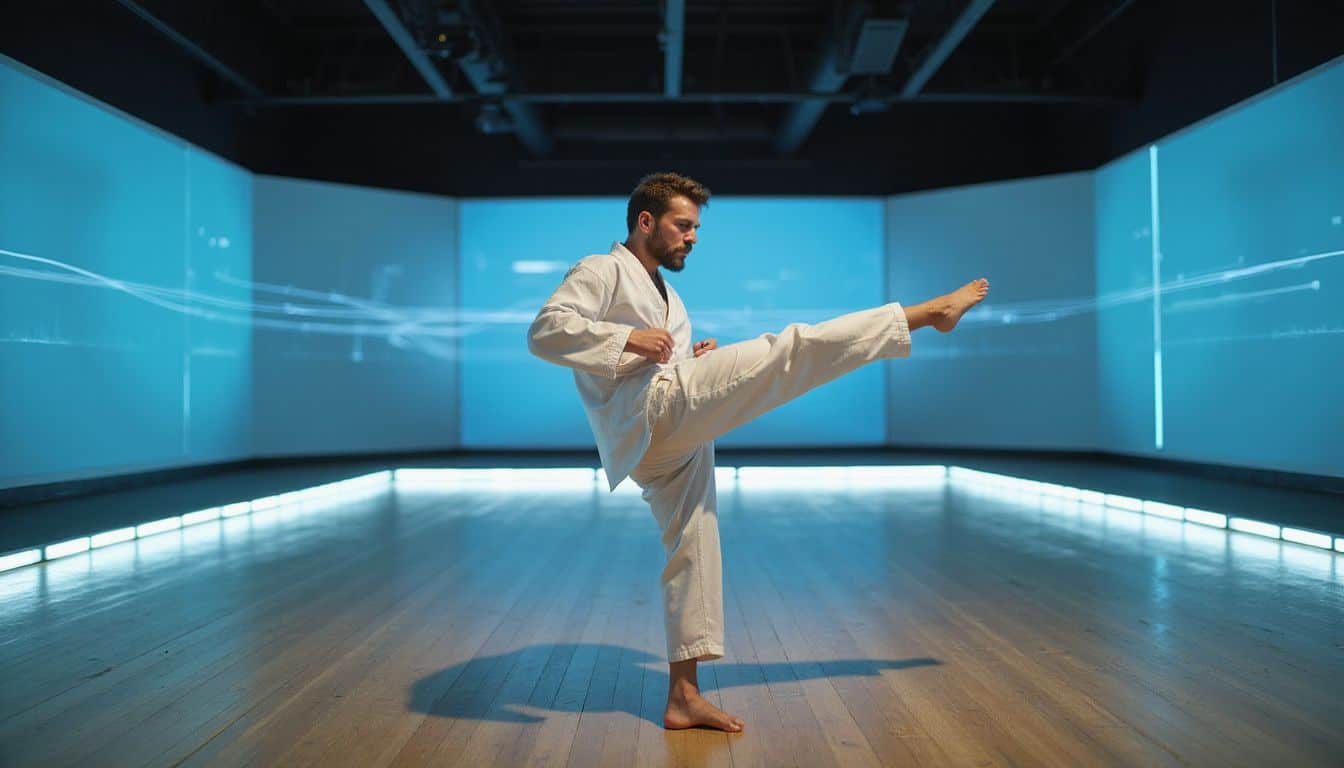 Virtual Taekwondo made its debut at the Olympic Esports Series in June 2023, held in Singapore. This digital version of the traditional martial art brought together eight Olympians who competed using motion-sensing technology to simulate real taekwondo movements.
Virtual Taekwondo made its debut at the Olympic Esports Series in June 2023, held in Singapore. This digital version of the traditional martial art brought together eight Olympians who competed using motion-sensing technology to simulate real taekwondo movements.
Players wore special sensors that tracked their kicks, punches, and defensive stances, translating these actions into the virtual arena.
Nigel Tan from Singapore claimed the gold medal in this new competition, marking a significant moment for esports integration into Olympic sports. The IOC’s approach with Virtual Taekwondo shows their commitment to sports simulations rather than violent games.
Competitors received trophies instead of traditional Olympic medals, indicating this event’s experimental nature. The technology allowed athletes to showcase their martial arts skills in a digital format while maintaining the sport’s core principles and techniques.
“Virtual Taekwondo combines traditional Olympic sport and modern technology, creating new opportunities for athletes to compete on a global stage.”
How was Gran Turismo 7 Motor Sport featured?
Gran Turismo 7 was featured at the inaugural Olympic Esports Series in Singapore during June 2023. The racing simulation game represented motor sport in this event, which aimed to integrate virtual sports into the Olympic framework.
Players from around the world competed in high-speed digital races, showcasing their driving skills on virtual tracks that mirrored real-world racing circuits.
French competitor Kylian Drumont won the gold medal in the Gran Turismo event, demonstrating exceptional racing prowess throughout the competition. William Murdoch from Great Britain secured the silver medal, while Angel Inostroza from Chile earned the bronze.
The series awarded trophies instead of traditional Olympic medals to the top three participants. This racing game’s inclusion was a step toward the Olympic Esports Games planned for 2027 in Riyadh, Saudi Arabia, though some critics questioned whether the selected game titles had sufficient global recognition compared to mainstream esports titles.
What occurred at the Chess.com Event?

The Chess.com event was part of the Olympic Esports Series (OES) 2023 in Singapore from June 22 to 25, 2023. Aleksei Sarana from Serbia won the gold medal in this competition, while Maksim Chigaev from Azerbaijan secured silver and Nguyen Ngoc Truong Son from Vietnam finished third.
This chess tournament was one of ten events that demonstrated how traditional board games could be integrated into the Olympic framework. The IOC’s goal to modernize the Games and connect with younger audiences was evident through this digital chess competition.
About 20,000 people attended over the four-day period to watch this event. The Olympic Esports Series presented trophies instead of traditional medals to the top three participants in each event.
This chess competition showed that strategic thinking and mental athletics deserved recognition alongside physical sports. The event’s success aligned with the IOC’s goal of incorporating digital innovation while maintaining competitive integrity.
The series also included motorsport action through Gran Turismo 7.
How did Tennis Clash participate?
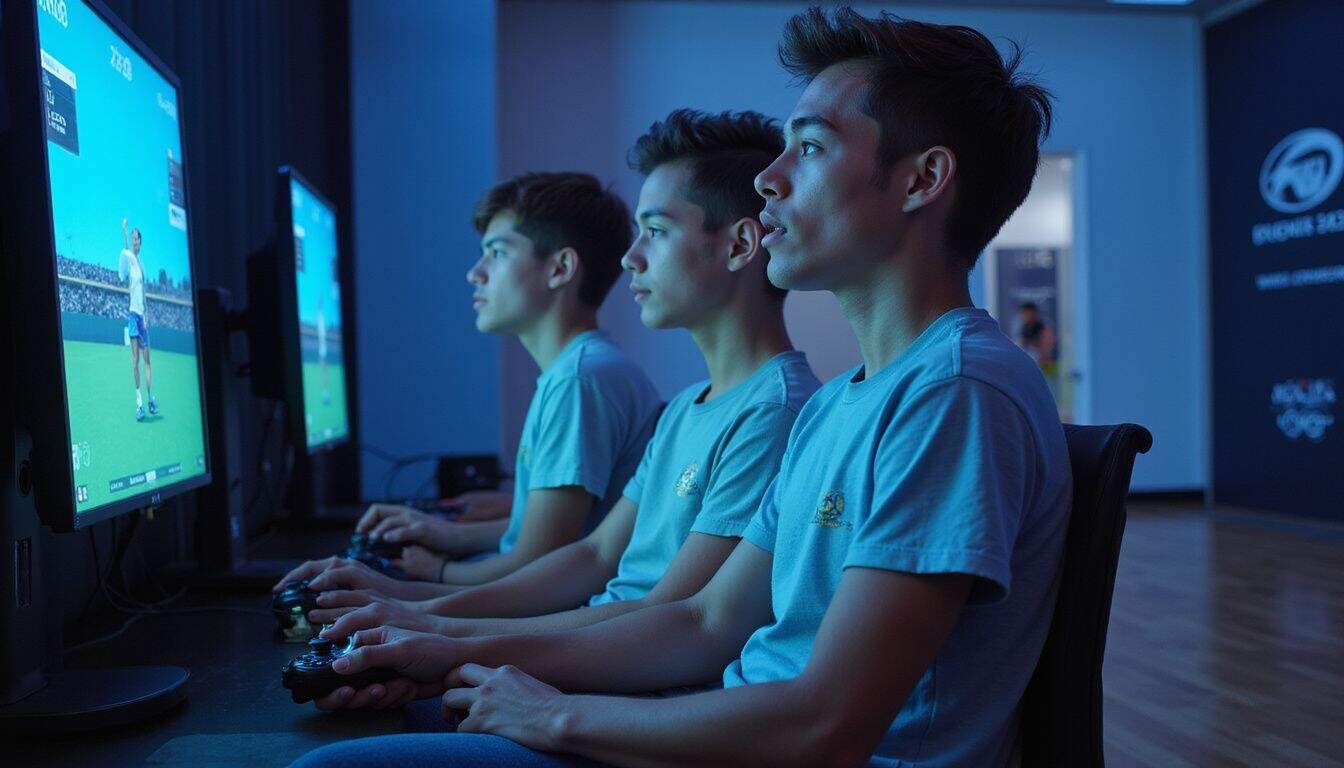
While chess dominated the strategic gaming category, Tennis Clash brought mobile sports gaming to Singapore’s Olympic Esports Series 2023. The tournament ran from June 22 to June 25, attracting both professional and amateur players to compete in this virtual tennis experience.
Anass Benghazi from France dominated the competition and claimed the gold medal position. He Shenghao from China secured silver, while William Foster from Great Britain earned bronze in the final standings.
The event organizers awarded special trophies to the top three participants instead of traditional Olympic medals, marking a unique approach to esports recognition. Over four days, approximately 20,000 spectators watched the action unfold, demonstrating strong audience interest in mobile gaming competitions at the Olympic level.
What is WBSC eBASEBALL™: POWER PROS in the series?
Tennis Clash brought mobile tennis action to the Olympic stage, but the series also featured America’s favorite pastime in digital form. WBSC eBASEBALL™: POWER PROS represented virtual baseball competition during the Olympic Esports Series 2023 in Singapore.
This game brought traditional baseball mechanics into the esports arena, giving players a chance to experience the sport through digital simulation.
The competition took place from June 22 to June 25, 2023, alongside other virtual sports events. Shoma Mori from Japan claimed the gold medal in the eBASEBALL event, showcasing his skills in this virtual baseball title.
The game allowed competitors to manage teams, execute strategic plays, and experience baseball’s tactical depth through gaming technology, proving that traditional sports can translate effectively into competitive esports formats.
The Upcoming Olympic Esports Games 2027
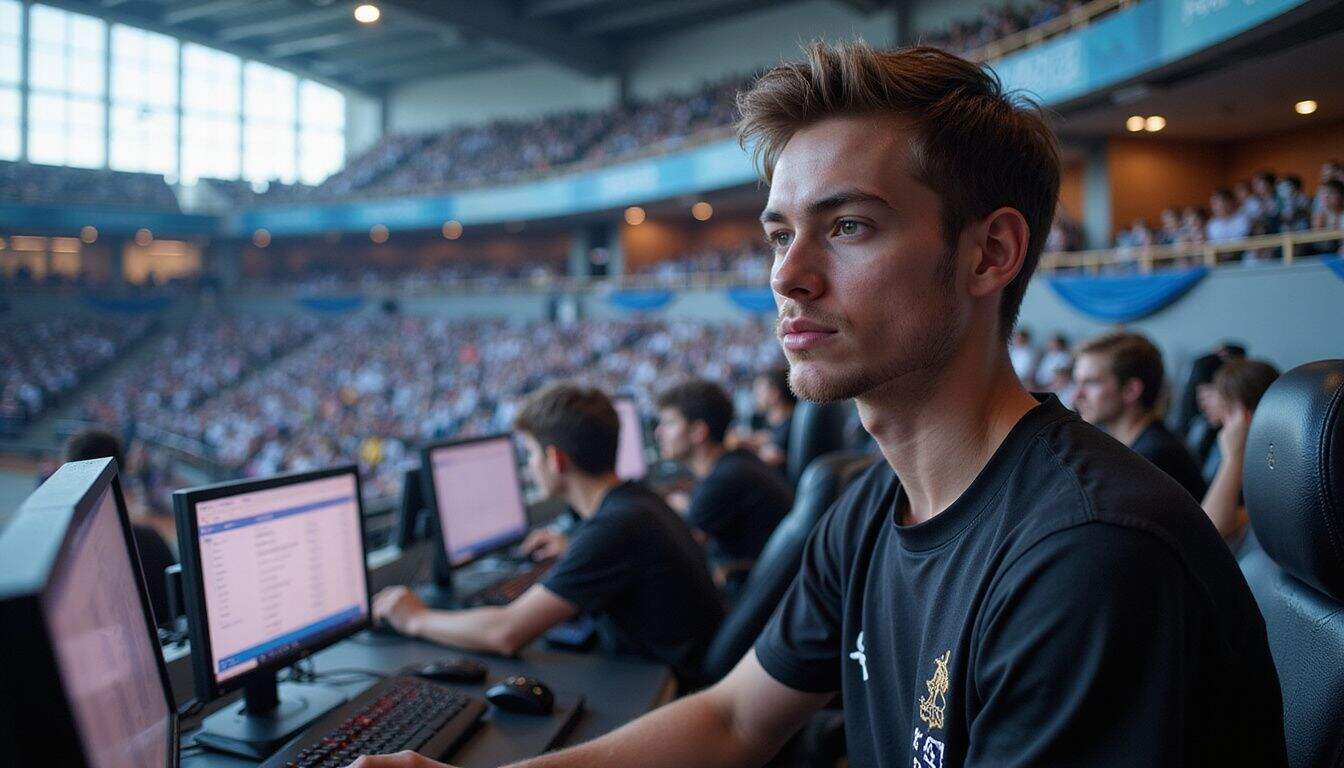
The IOC’s partnership with Saudi Arabia brings the first-ever Olympic Esports Games to the Kingdom in 2027, marking a historic shift in competitive gaming. Crown Prince Mohammed bin Salman’s Vision 2030 initiative drives this collaboration, positioning Saudi Arabia as a global esports hub while the IOC President Thomas Bach champions digital sport integration.
Where will the 2027 Olympic Esports Games be held and who are the partners?

Riyadh, Saudi Arabia will host the 2027 Olympic Esports Games, marking a significant moment for competitive gaming. Crown Prince Mohammed bin Salman’s Vision 2030 initiative drives this partnership, positioning the Kingdom of Saudi Arabia as a global esports hub.
The IOC signed an agreement with Saudi Arabia to host these games from 2027 through 2037, creating a long-term commitment to digital competition.
Major partners support this important event through strategic collaboration. The International Olympic Committee works directly with the Saudi Arabian National Olympic Committee and the Esports World Cup Foundation to organize the competition.
Worldwide Olympic partners including Airbnb, Alibaba, Allianz, Coca-Cola, and Visa provide backing for the Olympic Esports Series. Crown Prince Abdulaziz bin Turki Al Faisal leads Saudi Arabia’s esports development efforts, connecting traditional Olympic values with modern gaming culture.
Virtual and simulated sports will be the focus of this significant competition.
What virtual and simulated sports will be featured?
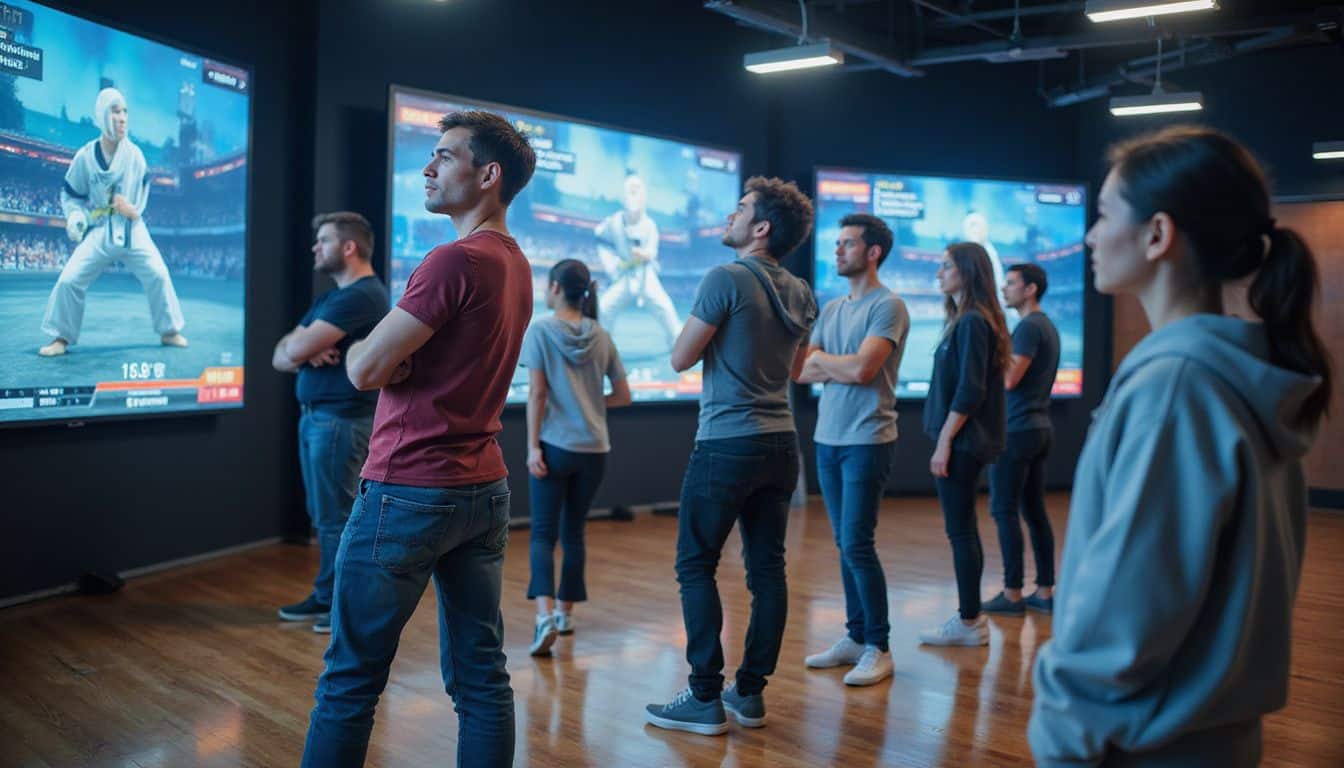
The IOC’s approach to the 2027 Olympic Esports Games focuses on traditional sports simulations rather than violent gaming titles. Olympic officials want games that connect with real Olympic events and promote the same values as traditional competitions.
- Virtual Taekwondo competitions will likely return after success in the 2023 Olympic Esports Series, featuring martial arts simulation that mirrors real Olympic taekwondo rules and scoring systems.
- Motor racing simulations like Gran Turismo 7 offer realistic driving experiences that connect with Olympic values while showcasing precision and skill development through virtual competition.
- Chess platforms including Chess.com events provide strategic gameplay that aligns with Olympic mental sports traditions and attracts global competitive communities.
- Tennis simulation games such as Tennis Clash recreate authentic tennis gameplay mechanics while maintaining connections to traditional Olympic tennis competitions and athlete development.
- Baseball simulations including WBSC eBASEBALL™: POWER PROS represent team sports digitally while preserving the strategic elements and competitive spirit of real baseball.
- Cycling and track events through virtual platforms will simulate Olympic cycling disciplines, offering realistic physics and competitive racing environments for global participants.
- Swimming simulations may feature stroke mechanics and race formats that mirror actual Olympic swimming competitions while providing accessible competitive opportunities.
- Just Dance rhythm games could represent artistic sports categories, combining physical movement with digital scoring systems that encourage active participation and creativity.
- Archery and shooting sports through ISSF partnerships will focus on precision-based competitions that exclude violent content while maintaining competitive shooting sport elements.
Why are violent games excluded from the event?
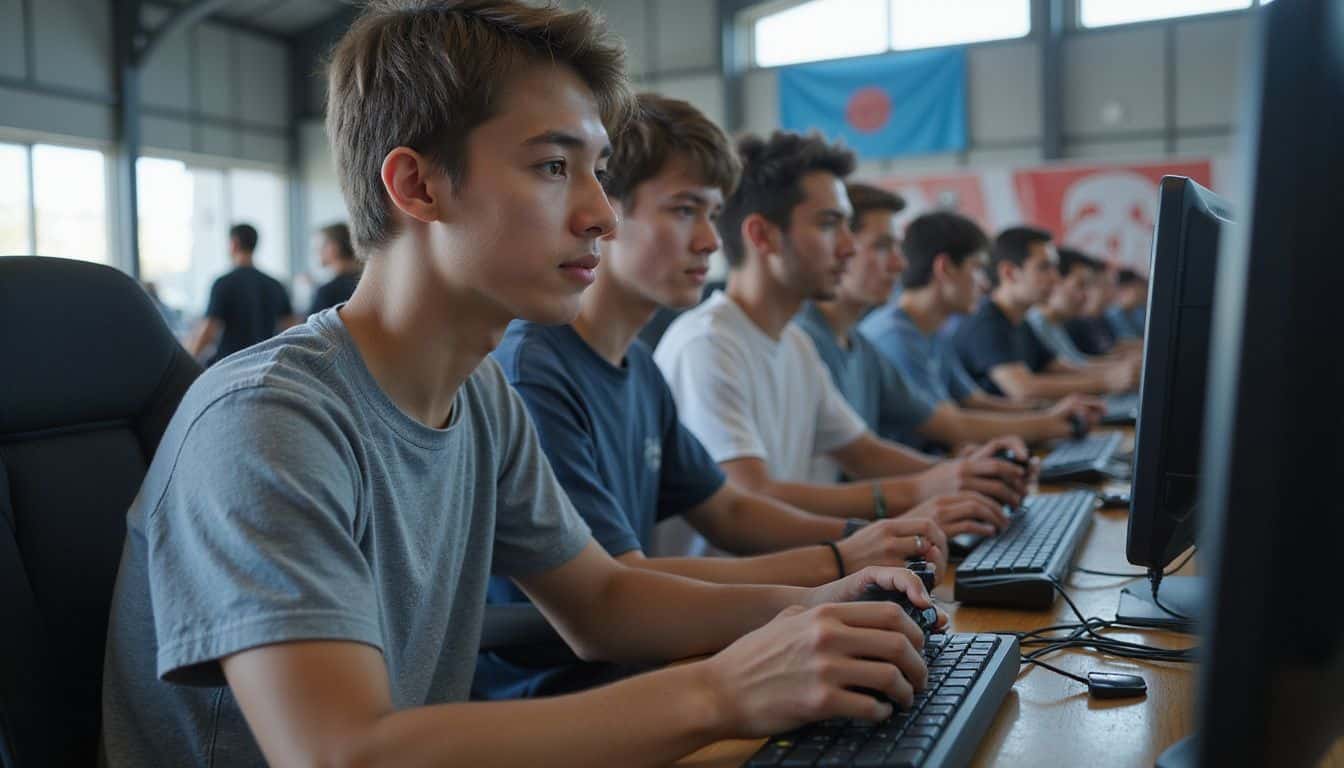
Violent games face exclusion from Olympic esports events because they clash with core Olympic values like peace and respect in sports. The IOC’s decision stems from their commitment to fundamental Olympic movement principles, creating a safe and inclusive environment that violent content might undermine.
Games like Fortnite won’t appear in the 2027 Olympic Esports Games, as organizers focus on sports simulation titles that promote positive, skill-based gaming experiences.
The exclusion reflects the IOC’s commitment to the fundamental principles of the Olympic movement.
Olympic organizers want to attract younger audiences through gaming while maintaining their values-based approach. The Olympic Esports Series features non-violent virtual sports and games that align with Olympic standards, ensuring the inaugural 2027 games showcase competitive gaming without compromising the movement’s peaceful ideals.
This strategy helps bridge traditional sports with digital competition in a way that respects Olympic traditions.
Benefits and Challenges of Esports in the Olympics
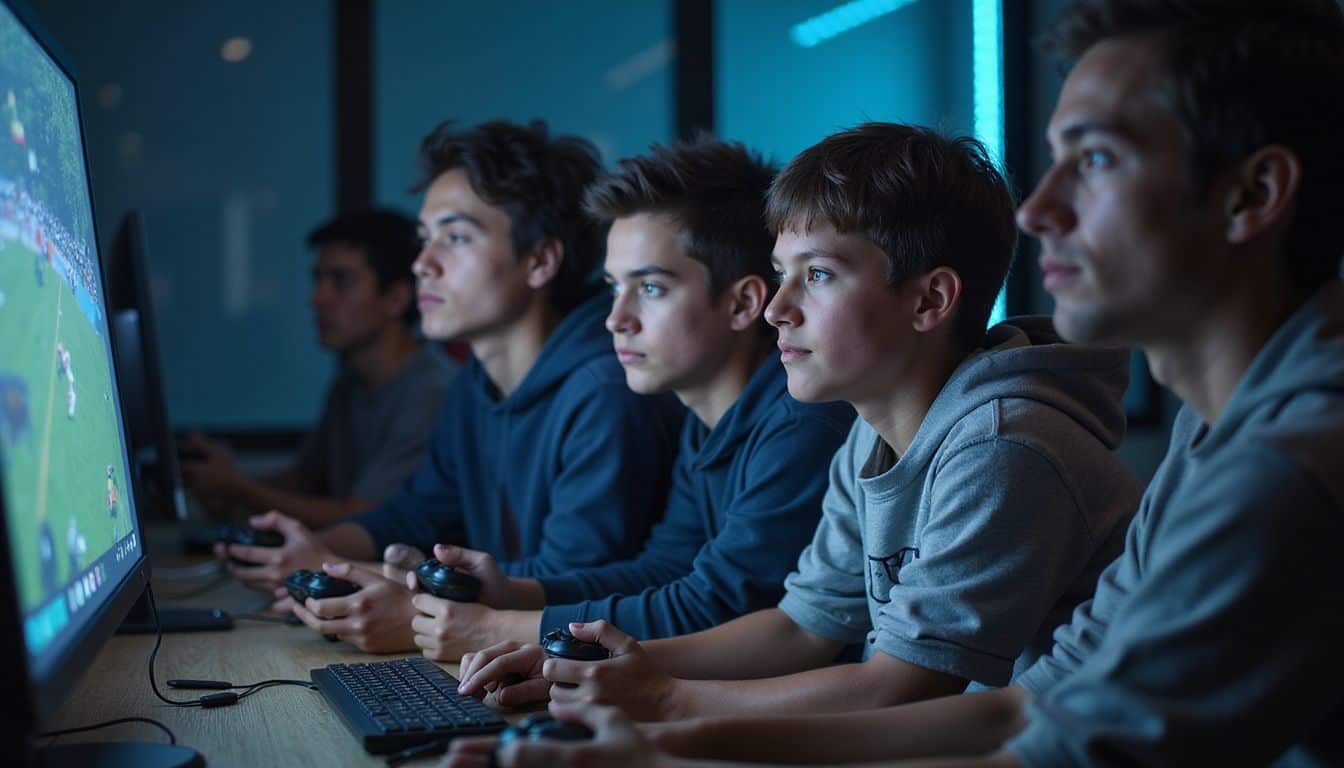
Esports brings fresh energy to the Olympics, attracting millions of young viewers who might skip traditional sports coverage. Yet the IOC’s careful selection process creates ongoing debates about which games deserve Olympic recognition and which don’t.
How does esports engage younger audiences?

The IOC’s strategy to connect with the “TikTok generation” through esports creates a direct bridge between traditional Olympic values and digital entertainment. Young gamers already spend countless hours mastering virtual sports, making the transition to Olympic-level competition feel natural and exciting.
The inaugural Olympic Esports Week in June 2023 drew about 20,000 spectators, proving that younger viewers crave this type of interactive entertainment. Game titles linked to international sports federations provide familiar experiences while maintaining Olympic standards, creating a perfect blend of competition and fun.
Virtual competitions remove many barriers that prevent young people from participating in traditional sports. Geographic location, physical disabilities, and expensive equipment no longer limit who can compete at the highest levels.
Professional esports athletes serve as role models for millions of young gamers worldwide, showing that dedication to gaming can lead to Olympic recognition.
The 2027 Olympic Esports Games in Riyadh, Saudi Arabia, will showcase how digital platforms can create global communities around competitive gaming. This approach transforms passive viewers into active participants, making the Olympic experience more personal and engaging than ever before.
The exclusion of violent game titles ensures parents feel comfortable supporting their children’s Olympic dreams through gaming.
How does esports promote innovation and inclusivity?
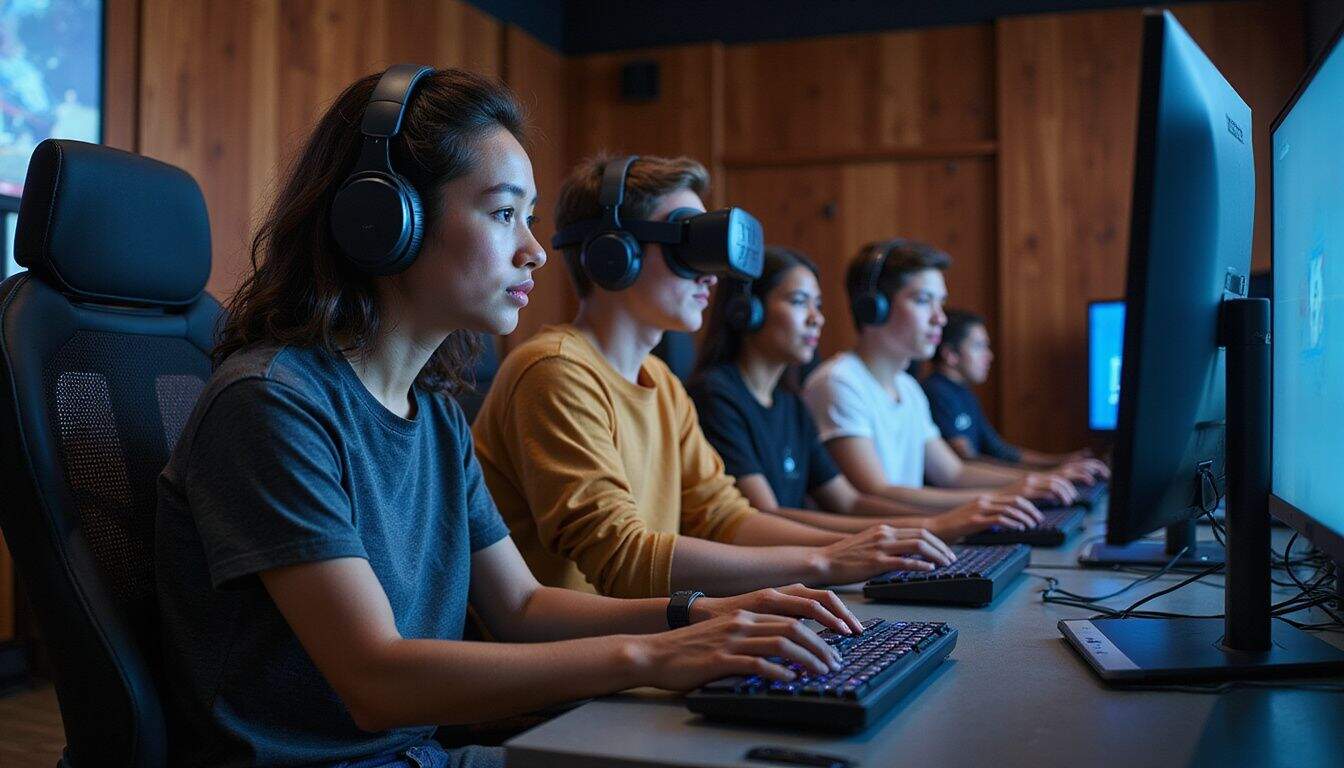
Esports pushes boundaries by adopting emerging technologies and creating new competitive formats that traditional sports can’t match. Olympic Esports Series showcases this innovation through virtual reality experiences, advanced gaming platforms, and digital environments that transform how we think about athletic competition.
Game publishers work directly with sports federations to develop fresh formats that blend physical skills with digital mastery, opening doors for athletes who might not excel in conventional sports settings.
Gaming communities benefit from unprecedented inclusivity as the Olympic Esports Series integrates diverse virtual sports and video games across multiple platforms. Women’s teams compete alongside male counterparts in equal standing, while participants from various geopolitical backgrounds represent their nations on digital stages.
This approach attracts diverse audiences and interests that span age groups, physical abilities, and geographic locations, creating opportunities for people who face barriers in traditional Olympic sports participation.
What concerns exist about game content in the Olympics?
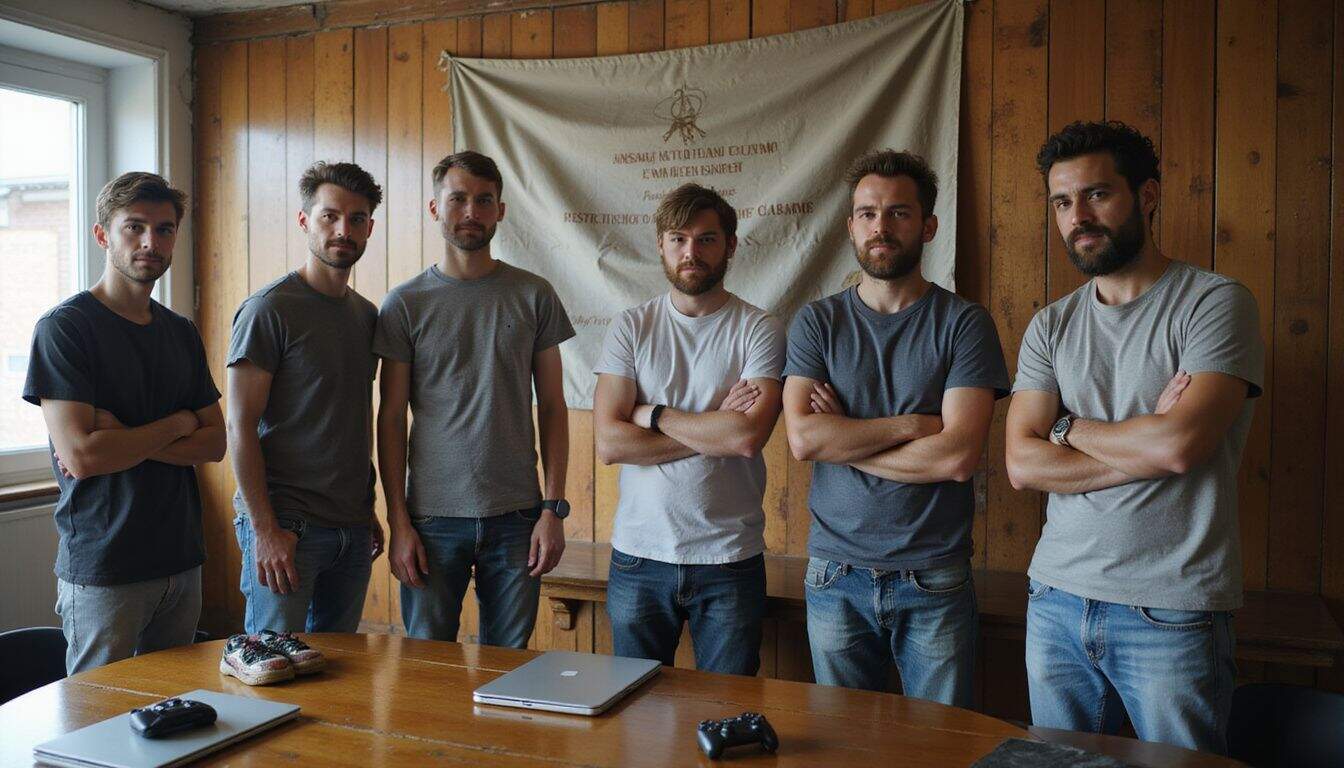
The IOC’s strict stance against violent games creates major headaches for Olympic esports inclusion. Popular titles like Counter-Strike and Dota 2 face automatic exclusion because they don’t align with Olympic values of peace and respect.
This decision feels pretty outdated to many gamers who see these competitive titles as legitimate sports. Critics argue that the selection process favors lesser-known games over established esports giants that actually have massive followings and professional scenes.
Game selection controversies extend beyond violence concerns, sparking debates about legitimacy and representation. The absence of a unified international federation for esports makes recognition even trickier.
Many question whether esports lacks the physicality needed for true Olympic status. Connectivity challenges also limit participation, especially hitting players from Africa hard. The current approach seems to miss what makes esports exciting for millions of fans worldwide.
The Future of Esports at the Olympics

The Olympic movement plans to blend esports with traditional sports over time, creating new partnerships between game developers and sports federations that could reshape how we experience competition.
The IOC’s vision includes expanding education programs and building stronger connections with younger fans who grew up gaming. Wu Jingyu and other Olympic champions see esports as a bridge between physical and digital athletics.
These games might even feature their own opening and closing ceremonies, similar to the Winter Olympics format. Ser Miang Ng believes this integration will happen step by step, not all at once…
and the changes coming in 2025 will surprise even the biggest gaming fans.
How will esports gradually integrate with traditional sports?
Esports integration with traditional sports follows a careful, step-by-step approach that respects Olympic values while embracing digital innovation. The IOC’s strategy focuses on virtual versions of established Olympic sports rather than standalone gaming titles, creating a bridge between physical and digital competition.
This method allows traditional sports federations to maintain control over their digital counterparts, ensuring consistency in rules and governance. Virtual taekwondo, for example, mirrors the physical sport’s techniques and scoring systems, making it familiar to existing fans while attracting new audiences.
Game publishers work closely with international sports federations to develop authentic virtual experiences that reflect real-world athletics. The collaborative structure mirrors traditional sports governance, involving multiple stakeholders who shape competition formats and standards.
The IOC’s exclusion of violent esports titles demonstrates their commitment to Olympic values, focusing instead on sports simulations that promote skill, strategy, and fair play. This gradual integration targets younger audiences while preserving the Olympic movement’s core principles, creating a pathway for digital sports to coexist with traditional events without replacing them entirely.
How will collaboration with game publishers and federations work?
This integration will require strong partnerships between key players in the gaming industry. The IOC’s collaboration with game publishers and international federations creates a three-way partnership that shapes Olympic esports competitions.
Game publishers bring their technical expertise and popular titles to the table. International federations provide sport-specific knowledge and regulatory oversight. The IOC coordinates these relationships while developing a unified regulatory framework for esports competitions.
This framework ensures fair play and maintains integrity across all Olympic esports events. Publishers work directly with federations to adapt their games for Olympic standards, while ongoing collaborations focus on anti-cheat measures and competitive balance.
These partnerships also support [establishing competitive esports organizations](https://www.geekextreme.com/how-to-start-an-esports-team/) that meet Olympic requirements. The IOC’s role involves selecting appropriate titles through careful consultation with both publishers and federations, creating a system where all parties contribute to the success of Olympic esports.
How Will Olympic Esports Transform in 2025?

Qualifying events for the Olympic Esports Games will commence in 2025, marking a crucial turning point for competitive gaming. The IOC’s strategy focuses on attracting the “TikTok generation” through these preliminary competitions.
Game publishers will work closely with sports federations to establish standardized rules and formats. These qualifying rounds will test various virtual sports across different regions, creating a global pathway to the 2027 games.
Olympic Esports Series competitions will expand significantly during 2025, offering more diverse virtual sports categories. Skill-based games will take center stage while violent content remains excluded to align with Olympic values.
Players from my local gaming community have already started preparing for these qualifiers, practicing daily on simulation platforms. The selection process will identify top talent worldwide, setting the foundation for what promises to be the most inclusive Olympic event in history.
People Also Ask
What is the IOC’s stance on esports joining the Olympics?
The IOC’s position has shifted dramatically over recent years. They now view competitive gaming as a legitimate sport worth including in future Olympic programs, marking a significant change from their previous hesitant approach.
When will esports officially debut at the Olympics according to the IOC’s timeline?
The IOC’s current plan targets 2027 for the first official esports Olympic competition.
How is the IOC’s decision affecting traditional Olympic sports?
The IOC’s embrace of digital competition is creating new opportunities for younger audiences while maintaining respect for classic athletic events. This balanced approach ensures both innovation and tradition coexist within the Olympic framework.
What changes can we expect from the IOC’s esports integration by 2027?
The IOC’s roadmap includes establishing official gaming categories, creating standardized competition formats, and developing new broadcast strategies. These changes will transform how we experience Olympic competition, blending physical and digital athleticism in unprecedented ways.
